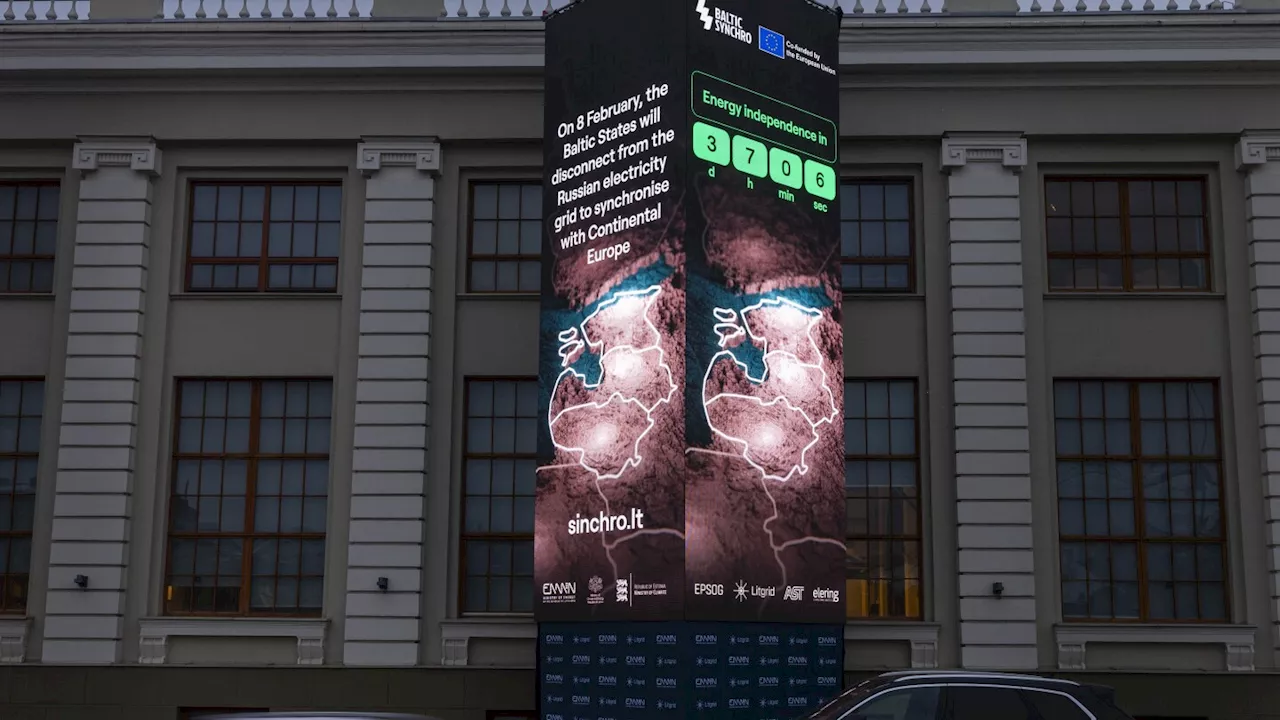The Baltic countries of Estonia, Latvia, and Lithuania will disconnect from the Russian electricity grid on February 8, 2025, marking a significant step towards energy independence and closer integration with the European Union.
Nearly 3 1/2 decades after leaving the Soviet Union, the Baltic countries of Estonia, Latvia, and Lithuania will this weekend sever their final electricity-grid connections to Russia and Belarus, formally turning to their European Union allies. This symbolic act, steeped in geopolitical significance, has been accelerated by Russia 's invasion of Ukraine three years ago, which severely damaged its relations with the EU.
The disconnection signifies a complete break from Russia's energy system, a legacy of their Soviet past. Lithuanian President Gitanas Nausėda described this event as 'physical disconnection from the last remaining element of our reliance on the Russian and Belarusian energy system.'A special 9-meter (29.5-foot) tall clock in downtown Vilnius will count down the final seconds of the Baltic states' electricity ties to Russia, with EU chief Ursula von der Leyen and other dignitaries expected to attend the ceremony on Sunday. The Baltic countries, all members of NATO, have maintained strained relations with Russia since declaring independence from the USSR in 1990. These tensions escalated further following Russia's full-scale invasion of Ukraine in 2022. Over the years, sixteen power lines connecting the three Baltic states to Russia and Belarus have been dismantled. A new grid linking them with the rest of the EU has been constructed, including underwater cables in the Baltic Sea. On Saturday, all remaining transmission lines between the Baltic countries and Russia, Belarus, and Russia's Kaliningrad region will be switched off one by one. The Baltic Power System will then operate independently for 24 hours in an 'island operation mode' before synchronizing with the Continental European and Nordic grids through links with Finland, Sweden, and Poland. The Kaliningrad region, already reliant on its own power generation due to its lack of land connections to mainland Russia, will not be affected.Kremlin spokesman Dmitry Peskov stated that Russia's energy sector had taken preparatory measures to ensure smooth operation on its side. He emphasized that the disconnection plan was announced in advance and required coordinated actions by both the Russian and Baltic energy companies. Despite advance notice, the Baltic nations remain vigilant against potential responses from Russia. Latvian Prime Minister Evika Siliņa acknowledged the risks, stating that Latvia was well-prepared with contingency plans in place. The Baltic countries have also been on guard against potential cyberattacks and disinformation campaigns, with Litgrid, Lithuania's electricity transmission system operator, highlighting the need for robust cybersecurity measures. Propaganda campaigns, spreading rumors about blackouts, energy shortages, and high bills, have surfaced on social media and through printed leaflets. However, the Baltic people remain resolute in their decision to disconnect, recognizing the geopolitical necessity and their commitment to European energy security.
Baltic States Russia Energy Grid Disconnection Geopolitics European Union NATO Ukraine War Cybersecurity
United States Latest News, United States Headlines
Similar News:You can also read news stories similar to this one that we have collected from other news sources.
 Baltic States to Sever Electricity Ties with Russia, Embracing European GridThe Baltic nations of Estonia, Latvia, and Lithuania are disconnecting from the Russian electricity grid on February 8th, marking a significant step towards full energy independence from Russia and integration with the European Union.
Baltic States to Sever Electricity Ties with Russia, Embracing European GridThe Baltic nations of Estonia, Latvia, and Lithuania are disconnecting from the Russian electricity grid on February 8th, marking a significant step towards full energy independence from Russia and integration with the European Union.
Read more »
 Baltic States Cut Ties with Russia's Power GridThe Baltic countries of Estonia, Latvia, and Lithuania are disconnecting from Russia's electricity grid, marking a significant step towards energy independence and aligning with their European Union allies.
Baltic States Cut Ties with Russia's Power GridThe Baltic countries of Estonia, Latvia, and Lithuania are disconnecting from Russia's electricity grid, marking a significant step towards energy independence and aligning with their European Union allies.
Read more »
 Baltic States Cut Ties with Russian Electricity GridThe Baltic states of Estonia, Latvia, and Lithuania will disconnect from the Russian electricity grid on February 8, 2025, marking a significant step away from Russian energy dependence. This move, years in the making, will see the Baltic countries synchronize their power system with Continental Europe, strengthening their ties with the EU.
Baltic States Cut Ties with Russian Electricity GridThe Baltic states of Estonia, Latvia, and Lithuania will disconnect from the Russian electricity grid on February 8, 2025, marking a significant step away from Russian energy dependence. This move, years in the making, will see the Baltic countries synchronize their power system with Continental Europe, strengthening their ties with the EU.
Read more »
 Baltic States Disconnect from Russian Electricity Grid, Signaling Energy Independence and Strengthening Ties with EUThe Baltic states, Estonia, Latvia, and Lithuania, will disconnect from the Russian electricity grid on February 8th, 2025, marking a milestone in their energy independence journey. This move signifies a strengthening of ties with the EU and a reduction in reliance on Russian energy resources.
Baltic States Disconnect from Russian Electricity Grid, Signaling Energy Independence and Strengthening Ties with EUThe Baltic states, Estonia, Latvia, and Lithuania, will disconnect from the Russian electricity grid on February 8th, 2025, marking a milestone in their energy independence journey. This move signifies a strengthening of ties with the EU and a reduction in reliance on Russian energy resources.
Read more »
 Baltic States Disconnect From Russian Power GridAfter nearly 3.5 decades, the Baltic nations of Estonia, Latvia, and Lithuania will sever ties with their Russian electricity grid, marking a symbolic victory in their efforts to distance themselves from their former Soviet overlords. The move, spurred by Russia's invasion of Ukraine, underscores the Baltic states' commitment to their European Union allies and signifies a shift in the regional energy landscape.
Baltic States Disconnect From Russian Power GridAfter nearly 3.5 decades, the Baltic nations of Estonia, Latvia, and Lithuania will sever ties with their Russian electricity grid, marking a symbolic victory in their efforts to distance themselves from their former Soviet overlords. The move, spurred by Russia's invasion of Ukraine, underscores the Baltic states' commitment to their European Union allies and signifies a shift in the regional energy landscape.
Read more »
 Red States vs. Blue States: Political Divisions Play Out at the State LevelThe article explores how political divisions between red and blue states are increasingly influencing public policy at the state level, particularly regarding immigration, abortion, education, and transgender rights.
Red States vs. Blue States: Political Divisions Play Out at the State LevelThe article explores how political divisions between red and blue states are increasingly influencing public policy at the state level, particularly regarding immigration, abortion, education, and transgender rights.
Read more »
